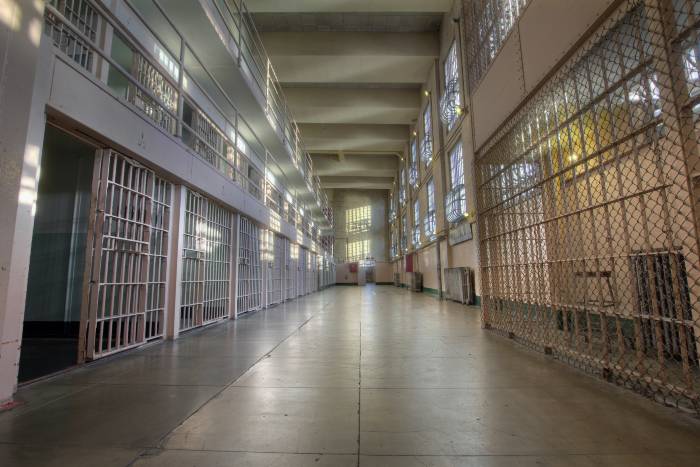Can A Personal Injury Lawyer For Prisoners Help File A Slip & Fall Lawsuit?
Update: Since we first reported on this prison injury case, a settlement was reached between prison officials and the victim. The amount awarded in the claim is significantly less than was demanded by the victim though it is still a substantial amount of cash. However, scroll down to learn about the latest twist of fate which may keep Gioeli from ever receiving his slip and fall settlement check.
A convicted Colombo family mobster has recently made headlines from prison. This time, he’s not the defendant in a criminal trial, but the plaintiff in a civil case stemming from a slip and fall accident that occurred while he was awaiting sentencing at the Metropolitan Detention Center in Brooklyn.
Thomas Gioeli, also known by the street name Tommy Shots, was convicted of three counts of conspiracy to commit murder in May 2012. In August 2013, he was playing a game of ping-pong with a fellow inmate when he slipped and fell on a puddle of water near the showers, breaking his kneecap, landing him in the hospital for 30 days, and requiring extensive surgery. Now, he’s suing the federal government for $10 million – alleging that the prison was negligent for allowing the puddle issue to go unattended. So does he have a case?
Gioeli Claims The Prison Was Negligent

Gioeli claims to have repeatedly notified prison officials about the puddling, which had allegedly been an issue for months. Prison orderly Sharif Stewart testified that he had to clean up the puddle twice per day and that he had complained to three different prison staffers at least 5-10 times about the slippery area and leaking sink.
Gioeli’s lawyer has argued that prison officials were negligent not only for failing to clean up the puddle but also for placing the ping-pong table near it. More specifically, the victim and his attorney are arguing that the prison violated their duty of care because they had been notified several times about the slippery conditions that lead to his fall, but did nothing to correct the hazardous condition.
Government Lawyers Claim Prison Exercised Reasonable Care
Defense lawyers for the government used Croc-like plastic clogs as a piece of evidence in their argument during the trial. These shoes are worn by all 120 inmates in the facility, and they are proven to be quite resistant to slips. Additionally, the government’s attorneys argued that water pools within the shoes which may have caused the puddle that Gioeli slipped in.
Prison Inmate Slip & Fall Lawsuit Update – Gioeli Awarded $250,000 in Settlement
In late 2019, more than 6 years since the original filing of the prison slip and fall claim, ex-mob boss Thomas Gioeli reached an agreement to settle for a total of $250,000. While this sum is orders of magnitude less than the originally-demanded $10 million, to many regular Americans this remains a potentially life-changing amount of money. Unfortunately for Gioeli, though, it may never make it into his bank account.
This is due to the fact that federal prosecutors are attempting to claw back some of the financial losses which were attributed to Gioeli during his time working for the mob. As it turns out, a court has ordered $360,000 to be paid in restitution to a fur store and a bank, both businesses believed to have been direct victims of the crime boss in the 90s.
No longer represented by an attorney, Gioeli himself filed an 83-page document in which he argues against his settlement funds being garnished. He employs veritable case law to note that federal courts do not hold the power to order payback as part of a criminal sentence. In light of these recent claims, it appears that Gioeli is making his court-ordered debt payments nonetheless. As it stands, he contributes $25 every three months to the aforementioned $360,000 in losses.
The latest reported remaining balance is $359,800, which entails Gioeli has been making payments for the last two years. At this rate, it would take more than 3,500 years for the remainder of the debt to be paid off.
Lawyers for Inmates’ Rights: Reasonable Care And Negligence In Correctional Facilities
Just like business and property owners, prison or jail officials have a legal duty of reasonable care. This means that they must do all that they can to keep inmates safe and to make sure there are no preventable hazards that could lead to an inmate injury or death.
When a correctional facility employee violates this duty of reasonable care and an inmate gets injured as a result, that inmate has the right to file a tort claim seeking financial compensation. Indeed, suing a county jail for negligence may be the only way a prisoner who is a victim of such a breach of duty has for obtaining compensation.
Can Inmates Retain a Personal Injury Lawyer for Prisoners and File a Lawsuit?
When someone gets injured in an accident caused by another person’s negligence, that injury victim often has a case for a personal injury lawsuit against the person responsible for causing the accident. For private citizens outside of prison or jail, this usually means filing a claim with the negligent party’s insurance company. However, inmates have a different process.
Suing Under The Federal Tort Claims Act
Inmates in federal prisons and jails, like the Metropolitan Detention Center where Gioeli was being held, have the option to file a Federal Tort Claims Act (FTCA) claim against the federal government. The claim Gioeli filed is an example of a Federal Tort Claims Act case.
Out in society, injury victims can directly sue the person responsible for causing their injuries if that person does not have insurance. But in jails and prisons, inmates do not have the right to directly sue employees they believe are responsible for their injuries. Instead, they must file a notice of claim and intent to seek damages from the federal government.
From here, the Justice Department has six months to respond to the injury claim. If they admit to fault, the inmate is paid right away. However, this is exceedingly rare. Claims are usually denied – and inmates have six months to hire an attorney who will exercise their civil rights to file a lawsuit after being issued this denial.
Damages In A Prison Personal Injury Lawsuit
In most personal injury cases, financial compensation is awarded for damages related to the accident such as medical bills, out-of-pocket expenses, lost wages, pain & suffering, and more. However, inmates are not charged for medical care and other medical expenses while in lockdown. These inmates also only make a few dollars per day, so lost wages are generally not a significant source of economic damage. Instead, a prison personal injury lawsuit usually focuses on expenses like future medical bills or other out-of-pocket expenses expected after their release.
The plaintiff in a prison personal injury case will need to prove three things:
- The correctional facility violated their duty of care
- How this violation occurred
- That this violation directly caused their injuries
In cases such as Gioeli’s, the general claim is that the Metropolitan Detention Center was negligent because prison guards and prison officials failed to fix a hazardous condition (a puddle of water) that they were aware existed and which eventually led to Gioeli slipping, falling, and breaking his kneecap.
My Family Member Was Injured In A Prison Accident – What Should I Do?
If you have a friend or loved one who was injured in a prison accident that you believe was preventable, it’s important to be aware of their legal rights. Inmates, like private citizens, have constitutional rights that permit them to go about their daily routine without being exposed to unnecessary risks due to the negligence of others. It’s important to hold these institutions liable when they violate the civil rights of inmates, which is in essence what they are doing when they allow dangerous conditions and inmate health hazards to persist.
Slip and fall cases are complex in general, but even more so when the accident occurs in a prison or other government property. Your loved one will need to file an injury claim either through the Federal or State Tort Claims Act. Additionally, he or she will be going up against powerful government lawyers who have plenty of resources and who specialize in denying injury claims.
This is why it’s important to have your own seasoned personal injury lawyer who understands how to prove negligence in court. If you’re thinking about taking legal action for a prison injury, a Philadelphia slip and fall attorney can help you better understand your legal options – just get in touch with us today to learn more in a free consultation.
Denied Medical Treatment In Jail?
If a loved one was denied medical treatment while they were in a correctional facility, you may have grounds for a legal claim. If you believe that such denial of medical care caused an inmate to perish, then a wrongful death lawsuit may also be in order.
Wrongful death claims can provide the same types of compensation encountered in prison slip and fall claims, though every case is different. Contact an attorney now via our helpline to learn more about your possibilities for compensation and to get started on the path to justice.
